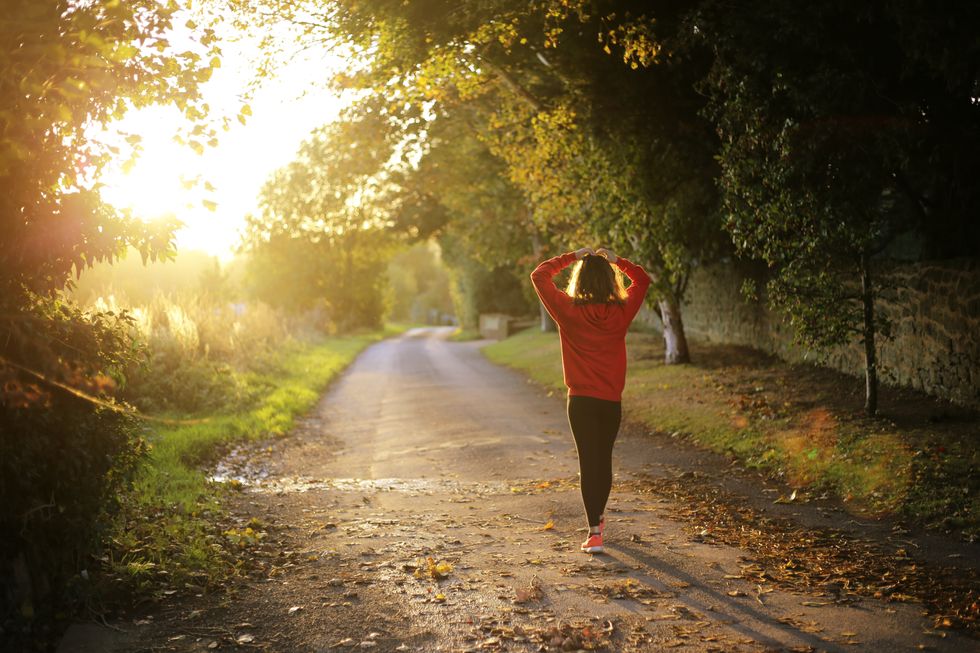Spring is on its way and the time to shed our winter coats and bulky boots is here. With warmer days ahead I am already itching to get outside and enjoy the sunshine. I have always felt better after spending time outside. While winter has some activities for people to enjoy in the great outdoors, I find myself tending to spend more time inside than out. I know I will get my fresh air fix come this summer, but it has got me thinking... Why do I enjoy being outside so much? What is it about the great outdoors that is so great for us? This is what I found out.
1. More Creativity
Having trouble writing that paper or finding some creative inspiration? You might want to take a quick break and step outside for a walk. Researchers at Stanford University’s Graduate School of Education found that students who walked came up with more "novel" and "creative" answers to test questions after taking a walk than they did after just sitting or being pushed in a wheelchair.
While other studies have shown that simply walking on a treadmill can help creative thought processes, the combination of being outside and physical activity has been shown to be even more helpful than moving while indoors.
2. More Receptive To Environmental Issues
We know now that human activity is a large contributing factor in global climate change. In order to make changes in the health of our planet, a huge goal will be to get humans on board with conservation efforts. Psychologist Susan Clayton, PhD has observed that when people go to zoos, they are looking to feel a connection with the animals there. When they feel this, they become more focused and receptive to ideas of conservation.
Being outside makes people feel good and animals are a great way for humans to connect to the wild nature all around us. So if you are looking to get more people on board with climate change efforts, take them outside and get them around some animals.
3. Therapy + Outdoor Activity = Results
Multiple therapists have found that taking their clients outside results in better sessions. The lack of walls, fresh air, movement, and opportunity to make connections with their therapist all help clients work through each session in a more successful way.
Psychologist Kate Hays, PhD, knows that exercise is often suggested to clients as a way to help improve their quality of life. Being able to model some of these actions together with a client while being outside is helpful in getting them to incorporate it in their daily life.
4. Children's Development
Over the years children's activities have tended to be primarily indoors, and the amount of time outside has decreased. In fact, a study by University of Maryland sociologist Sandra Hofferth, PhD, found that the amount of time doing outdoor activities decreased 50% in children from 1997 to 2003. Along with this lack of activities, the rate of childhood obesity has also gone up.
However, studies have shown that being outdoors has numerous benefits on children, "including reduced stress, greater physical health, more creativity and improved concentration." It is crucial that children spend time outdoors. This includes breaks during school, playing with friends, and exploring the great outdoors. Any time spent outside is time well spent.
5. Healthier Living Spaces
While it is shown that being outside is beneficial to a person's health, not everyone has the outdoor spaces available to them to engage in these activities. However, James F. Sallis, PhD, a psychology professor at San Diego State University, 'has found that small changes in the physical environment can make big differences in healthy behavior."
While looking at a neighborhood's "walkability" index, which includes "residential density, land use mix, retail floor area and the presence of streets," has shown to make significant improvements in a person's life. Just a 5% increase in walkability has led to people walking or biking an extra half hour. This leads to a healthier weight and lifestyle.
6. Lower Stress Levels
Are you looking for a better way to relieve stress and unwind? Spending time outside may be the solution you're looking for! Whether it is taking a quick walk, being nearby a natural green-space, or even just having some plants around your desk can be helpful.
A study done by Nancy M. Wells, PhD, an assistant professor of design and environmental analysis at Cornell's College of Human Ecology, and Gary W. Evans, PhD, the Elizabeth Lee Vincent Professor in the same department, found that incorporating these small changes helped children deal with stessors in their life more easily.
Whether it's taking a short walk, biking through a park, or climbing a mountain, anytime spent outdoors is beneficial to your life. So put on your tennis shoes, find something you love to do, and get outside!
















